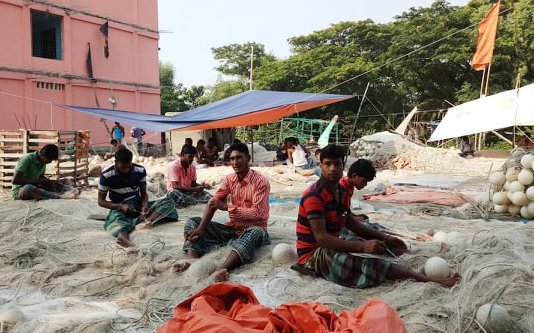By Rafiqul Islam
HATIYA, Noakhali, Sept 8, 2019 (BSS) – Coastal fishermen with frequent money troubles fall to situations like a fish out of water as growing number of extreme climate events, including cyclone and storm surge, force them to refrain from fishing in the sea.
The off-again-and-on-again furies of the sea have been severely affecting the livelihoods of the country’s coastal fishermen, who would love to live a humble existence.
Fishing in the sea lends the fishermen a sense of financial security – a life-saving tool in the coastal areas filled with insecurities and no alternative livelihood option. This entails overcoming financial troubles for families traditionally depend on men to bring in an income from fishing.
Abul Kalam Maji (64) of Hatiya Island is no exception. Maji, who has been catching fish in the Bay of Bengal for 30 years, said he has to remain idle for 10 to 15 days every month during the summer and monsoon, with recurrent cyclone warnings asking fishermen not to go to the sea for fishing.
“I faced 10 to 12 devastating cyclones, including the 1991’s Gorky, Mohasen and Nargis, in my life, but never saw such increased number of cyclone warnings in the past. Now, we cannot go to the sea for 10 to 15 days every month on an average during the summer and monsoon,” he told BSS.
Kalam Maji, who lives in Kalirchar area of Hatiya Island in Noakhali, retells a terrible experience of cyclone he faced two years ago.
“We went to the sea for fishing in Ashshin month (October in English calendar) two years ago and suddenly we heard a cyclone warning, which asked us to reach shore. “But, it was too late. Our fishing boat was hit by the cyclonic storm before reaching the shore and we were stuck in a small island, 40 kilometres off the coast, and saved our life. Next day we reached the shore,” he said.
Bangladesh is one of the most vulnerable countries to climate change and the effects of global warming make the country more cyclone-prone, with an annual increase of 0.05 cyclones per year. Cyclones hit the coastal regions of Bangladesh almost every year, in early summer (April/ May) or late rainy season (October/ November).
During 1877-2017, the country was hit by 154 cyclones, including 53 severe cyclonic storms, 43 cyclonic storms, and 68 tropical depressions. And the recurrent weather events affect the lives and livelihoods of coastal fishermen severely as they cannot go to the sea for fishing, the only livelihood option for them, due to the increased number cyclone warnings.
According to official data, Bangladesh Meteorological Department issued a total of 12 warnings or signals in the country’s coastal region in 2018. And, in every warning, fishermen were asked to remain in safe shelters and not to go to the sea for fishing for minimum two days to maximum 15 days.
Fishermen did not go to the sea for 75 days last year. Meteorologist Aftab Uddin said the Met office has as far issued 12 cautionary signals in the bay this year.
“Fishermen did not go to the sea for a total of 55 days this year as they were asked to remain safe places seeing the signals,” he added.
Since the coastal fishermen are experiencing the increased number of cyclone warnings in recent years, they cannot to go to the sea for fishing, which affects their livelihood.
The recurrent extreme climate events put them and their families in plight.
Besides, the government restricts fishing in the sea and coastal rivers for 22 days every year from October 7 to October 28 to protect the mother fish during the peak breeding season of Hilsa aiming to boost its output.
“During the peak period when cyclones hit (April to June and September to November), we cannot go to the sea for fishing for 7-15 days per month on an average as we have to face one more cyclone warning each month,” said Nijam Maji of Kalirchar area.
Noting that fishing is their lone livelihood option to survive in the island, he said it is very simple that their income would decline and they would suffer from food and other needs if they cannot go to the sea for fishing.
Abdul Malek, a fisherman who has been fishing in the sea for 27 years, said his income falls drastically in recent days, affecting his family severely, as his earning days have declined significantly due to growing extreme climate events like cyclone and storm surge.
“As a result, we are running short of meeting the educational and healthcare expenses of our children. Even, we cannot feed them three meals a day,” he said, adding “Families of many fishermen now remain hungry for want of food”.
Hatiya upazila chairman Mahabub Morshed Liton said when the fishermen cannot catch fish in the sea due to natural disasters, the government distributes food grains among them through ‘fishermen cards’.
“But, the number of cards is meager, which needs to be increased,” he added. He said the upazila administration will negotiate with higher authorities to find a way on how to provide support to the fishermen during their crisis period.
The UNDP is providing support to them by creating livelihood options there under a project, but it is not enough as there are a huge number of fishermen in the coastal region, UNDP community development officer Mizanur Rahman Bhuiyan said.
Malik Fida A Khan, a deputy executive director of Center for Environmental and Geographic Information Services (CEGIS), said alternative livelihood options must be created for the fishermen as they struggle for works during the period when cyclones hit.
“Inland cage fish cultivation could be introduced in the coastal canals to create alternative livelihood for fishermen and it would be a good adaptation option,” he said, adding the cage fish culture is now very popular in many countries, including Vietnam.



